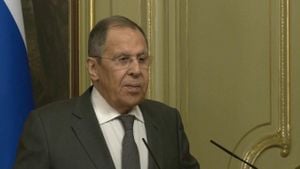BANDUNG – On February 24, 2025, Indonesia's government took significant steps to bolster its investment framework through various collaborative initiatives. President Prabowo Subianto officially signed several legal products aimed at improving the management of State-Owned Enterprises (BUMN) and pursuing national strategic investments. This historic signing took place at Istana Merdeka, Jakarta, and indicates the government’s commitment to more effective governance and investment management.
The three legal products signed by President Prabowo included the Law Number 1 of 2025, which amends the Law Number 19 of 2003 on State-Owned Enterprises and introduces significant reforms. President Prabowo stated, “Selanjutnya saya juga menandatangai Keputusan Presiden Nomor 30 Tahun 2025 tentang Pengangkatan Dewan Pengawas dan Badan Pelaksana Badan Pengelola Investasi Daya Anagata Nusantara, Danantara Indonesia.” This reflects the establishment of Danantara as the national strategic investment management body, which aims to optimize the use of state assets to improve public welfare.
Alongside President Prabowo were key figures including Minister of State Enterprises Erick Thohir and Minister for Investment Rosan Roeslani, who attended the signing ceremony, highlighting the importance of governmental collaboration. Minister Thohir emphasized the need for enhanced effectiveness within BUMN frameworks, which would, in turn, support Indonesia’s competitive edge internationally.
On the same day, Vice Minister of Trade Dyah Roro Esti Widya Putri and Vice Minister of BUMN Kartika Wirjoatmodjo announced the signing of a Memorandum of Understanding (MoU) aimed at strengthening the synergy between the Ministry of Trade and Ministry of BUMN. This agreement is focused on promoting growth among Small and Medium Enterprises (UMKM) to boost the national economy and expand both domestic and global market access for Indonesian products.
Minister Widya highlighted the importance of UMKM within the economic framework, remarking, “Nota kesepahaman tersebut untuk memperkuat sinergi dalam mendorong pertumbuhan ekonomi nasional melalui UMKM.” This collaborative effort aims to empower smaller businesses, ensuring they have the resources and support necessary for sustainable growth.
Efforts to streamline local governance were also prominent on this date, with the West Java Law and Human Rights Office conducting a harmonization meeting focused on building regulations. This meeting was held digitally through Zoom due to technological advancements ensuring wider participation. Local government officials from Cianjur actively engaged in discussions about the proposed regulations governing building boundary lines to prevent arbitrary construction.
During this virtual session, Cianjur’s legal department presented the draft regulation and sought input from the West Java Law Office. The significance of establishing clear building boundary lines aligns with the government's overarching goal to maintain order and sustainable urban development.
Officials from the West Java Law and Human Rights Office advised local governments to take practical circumstances on the ground seriously. They encouraged the Cianjur administration to draft regulations reflective of local conditions rather than relying solely on previous standards, pushing for clarity and technical precision. This kind of groundwork is fundamental to prevent discrepancies and promote adherence to legal standards.
Minister for Home Affairs Tito Karnavian underscored the need for efficient local spending, urging local governments to reduce unnecessary expenditures especially of ceremonial nature. He conveyed this message via his recent circular urging regional authorities to reallocate funds toward sectors directly benefiting citizens, such as education and healthcare.
Minister Karnavian stated, “Saya juga meminta daerah melakukan efisiensi belanja. Di antaranya mengenai masalah alat tulis kantor, perjalanan dinas dikurangi, rapat yang tak perlu, kemudian kegiatan seremonial.” The focus on reallocative efficiency reflects the administration’s priority on maximizing the impact of public funds.
With these multifaceted initiatives, Indonesia is taking bold steps toward improving its governmental collaboration on investment management and economic growth. The synergy between various ministries and regional governments emphasizes the Indonesian government’s strategy to create a structured and supportive environment for both large enterprises and small businesses alike.
The effective interplay of legal frameworks, investment oversight, and support for local business reveals Indonesia's direction toward sustainable and inclusive economic development. The government's commitment to clear regulations and collaborative synergy exhibits its readiness to address contemporary economic challenges and bolster growth.
These actions signify more than just bureaucratic steps—they represent Indonesia's strive for improved governance, investment opportunities, and economic resilience. The partnerships formed on this day set the stage for future investments, aiming to transform Indonesia’s economic dynamics for the benefit of all citizens.



